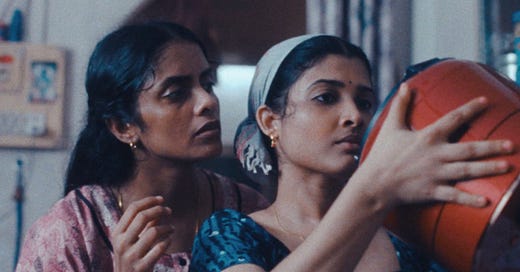Review: All We Imagine as Light (2024)
This Cannes Gran Prix winner centers working class women
All We Imagine as Light (2024)
Written and directed by Payal Kapadia
Some good movies are hard to write about, and this is one of them. This happens when the gestalt of the film, the atmosphere and subtle tonal shifts, dominate the viewer’s experience rather than narrative. Because not very much happens — there’s little mystery or competition or malice or moral decisions by the characters, the elements that drive most plots — I have to try to describe the way the film looks or, ideally, how it accomplishes the creation of so much beauty.
Some of that you’ll have to just believe in; that the film won the Cannes Film Festival is also a significant endorsement. Really you could do worse than skipping this review and just heading for the cinema while it’s showing in theaters.
Prabha (Kani Kusruti) is an accomplished nurse at a Mumbai hospital. She wields influence and expertise in a system where nurses pretty much run everything and the actual doctors are saved for unique tasks like official diagnoses or surgery. She brings a subtly commanding presence. Her roommate Anu (Divya Prabha), also a nurse, is younger and in the throes of a romance with a Muslim man. Prabha has a failed arranged marriage to a husband who left for Germany soon after the wedding and has never returned. In fact, it’s been years since she’s heard from him. Despite her loneliness, she resists the interest of a doctor she works with.
A third hospital worker is Pavarti (Chhaya Kadam), a middle-aged cook being evicted from her apartment building by greedy real estate developers. Prabha tries to get legal help for her, but when it becomes clear that her case is hopeless, Pavarti decides to return to her seaside village, where the third act takes place.
There are two things I found fascinating: the working-class world of Mumbai populated by the characters and their patients, and the performance by Kani Kusruti in the main role. She has a stirring, heroic visage that is absorbing to watch while emotions play across it. Like any good actor, she’s at least as interesting to watch in silence and stillness as in action.
The soundtrack, refusing to confine itself to South Asian sounds, boosts the atmosphere in every scene. But the script and direction by Payal Kapadia are the biggest accomplishment here, measured in the degree of subtlety the characters’ shifts in attitude and feeling happen, and how clarity comes to them about what they want and need — in a patriarchal system designed to exploit and exhaust them. There are moments when the movie seems about to tip into magical realism, and I was glad it never did. The characters’ lives and the setting are real enough.




Beautiful review, Mark! I look forward to seeing this movie.